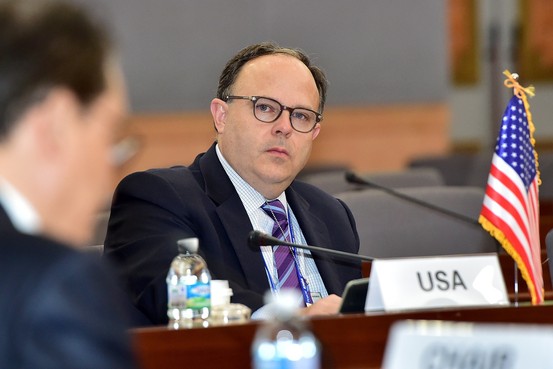Posted on : Jul.31,2015 14:55 KSTModified on : Jul.31,2015 14:55 KST
 |
Sydney Seiler, the US State Department’s Special Envoy for the Six-Party Talks |
In wake of Washington’s deal with Iran, still no common ground on resuming Six Party Talks
North Korea and the US are facing off over the conditions for resuming nuclear dialogue in the wake of Washington’s recent nuclear deal with Iran.
That could mean that serious negotiations on the North Korean nuclear program will not start until after next year’s presidential election in the US.
Responding to questions from a Korean Central News Agency reporter on July 29, a spokesperson for the North Korean Ministry of Foreign Affairs said, “Dialogue could become a possibility and many issues could be resolved if the US makes the decision to stop engaging in hostile activities such as joint military exercises [with South Korea] and chooses a different path.”
The remarks were a counterproposal to comments made on July 27 by Sydney Seiler, the US State Department’s Special Envoy for the Six-Party Talks, during his visit to South Korea.
“Unfortunately we are in this protracted period where the DPRK has been reluctant to engage in dialogue with us,” Seiler said at the time.
Pyongyang‘s latest comments echo a previous proposal in Japan, which it said it could temporarily suspend its nuclear testing if the US suspended its joint military exercises with South Korea. After arriving in South Korea on July 26, Seiler visited China on July 28 and attended discussions among deputy representatives for the six-party talks from South Korea, the US, and Japan.
As in January, both Seoul and Washington flatly rejected the North Korean proposal.
Speaking at a regular briefing on July 30, Ministry of National Defense spokesman Kim Min-seok said the joint exercises were “annual and defensive.”
“Joint exercises with the US cannot be a precondition for interchange between South and North,” Kim said.
Pentagon spokeswoman Henrietta Levin also rejected the demand in a Voice of America appearance on July 27, saying the joint exercises had been held in a “transparent and regular” manner for forty years.
Some observers suggest the attitude may reflect the Obama administration’s conclusion that it does not need to work actively to resolve the North Korean nuclear issue now that it has achieved relations with Cuba and a resolution on the Iran nuclear issue.
“It looks as though the goal of Mr. Seiler’s visit was not to work toward resuming the six-party talks, but to talk about the new missile technology that China and North Korea are planning to show off at the World War II victory holiday on Sept. 3 and the anniversary of the Workers’ Party of Korea founding on Oct. 10, respectively,” said Korea National Strategy Institute director Kim Chang-soo.
“North Korea’s nuclear weapons are expected to reach a level next year when they will be able to threaten the mainland US, and I foresee the nuclear negotiations between Pyongyang and Washington resuming once the next administration comes to office,” Kim predicted.
By Kim Ji-hoon, staff reporter
Please direct questions or comments to [english@hani.co.kr]

